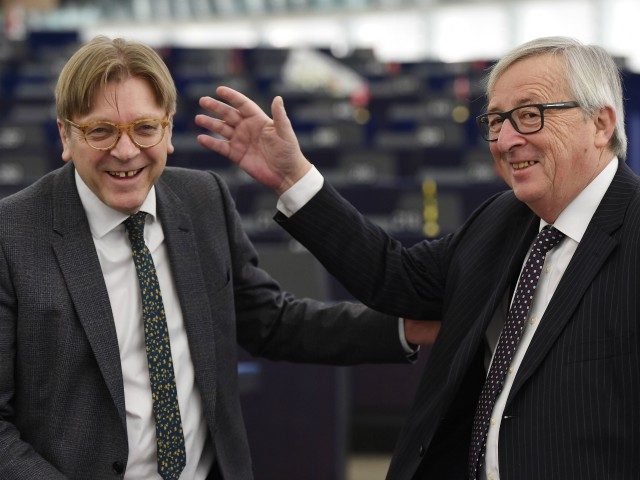Members of the European Parliament have voted in favour of introducing financial sanctions as punishment for patriotic countries that reject the bloc’s progressive “European values.”
MEPs voted Thursday in Strasbourg, France, to back the European Commission’s proposal to cut EU budgetary disbursements to member states deemed to have broken the so-called “rule of law,” with 397 MEPs voting in favour and 158 against (69 abstaining), reports Politico.
The votes were notably split along eastern/western divides, with those in favour coming from establishment western European parties with those against coming from conservative and right-wing eastern parties.
European Commission budget chief Günther Oettinger said, “The current definition of the scope of the proposal provides for a proper balance between the (budget) and other aspects of the Union mechanism, for example, Article 7 of our Treaty.”
“It’s not a question of sanctions per se, it’s a question of the protections of the European money.”
“If there is a financial penalty, it must be proportionate to the gravity of the offence or breach of the principles of the rule of law,” Mr Oettinger added.
‘European Spring’: Italy’s Salvini Building Alliance with Poland to ‘Save Europe’ https://t.co/xzGorcTRIb
— Breitbart London (@BreitbartLondon) January 10, 2019
The proposal was widely seen as formalising another mechanism to punish Hungary and Poland for their perceived infringement on the Brussels rule of law and rejection of “European values,” with both nations being net beneficiaries of EU funds.
Hungary and Poland have come to blows with the bloc over national matters, with Poland’s reform of the Communist-era-dominated judiciary, Hungary’s legal reforms to stop the interference of foreign-funded civil society groups, such as billionaire philanthropist George Soros’s Open Society Foundations (OSF), in domestic affairs, and both countries’ rejection of the forced redistribution of third-world migrants.
The countries right-wing and conservative governments have all had Article 7 proceedings triggered against them; if invoked, it would result in the countries losing voting rights, and may now result in loss of funds, also.
Hungary condemned the results of the vote, with the government’s Minister for State for EU Policies Szabolcs Takács saying, “Hungary cannot be blackmailed into giving up her stance on migration.
“Today’s European Parliament vote on the MFF (Multiannual Financial Framework) Rule of Law proposal is yet another attempt to punish Central Europe with obvious political intention and will only lead to further conflicts in the EU.”
Orbán, Salvini Set to Take On Globalism at EU Elections with Anti-Migration Front https://t.co/a3i860I9d7
— Breitbart London (@BreitbartLondon) August 29, 2018
On the same day, the EP approved a “Rights and Values” programme in the next MFF, earmarking 1.8 billion euros for it.
Arch Europhile and critic of pro-sovereigntist nations like Hungary Guy Verhofstadt MEP (pictured left with Commission President Jean-Claude Juncker) applauded the move, his group the progressive Aliance of Liberals and Democrats in Europe (ALDE) writing that the scheme would “support those actors that defend European values across the EU, such as NGOs” while host nations may be strangled for funds if deemed to have breached “European values.”
Sophie in‘t Veld, member of the ALDE and listed as a “reliable ally” of Soros’s civil society groups, said, “Today, the European Parliament is taking an important step to defend European values.
“There is a consensus about setting up a mechanism to withhold EU money from Member States that fail to respect human rights and the rule of law.”
“But it is a carrot and stick approach: we are also setting up this new Rights & Values fund of 1.8 billion euros, specifically intended to support NGOs that do stand up for European values,” Ms in‘t Veld added.
Citizens of European Union member states are set to go to the polls in May to elect MEPs, with Eurosceptic parties set to make gains and displace the dominance of progressive parties in the parliament.
In January, populist Italian deputy prime minister Matteo Salvini met with Poland’s governing conservatives, seeking to form a “new European Spring” to combat the “French-German axis” in a battle for the future of Europe.
“It will be the best answer to all the Eurosceptics… and maybe their popular movements will give life to a new European spring, a dream that someone stole from us in the name of finance and banking.”

COMMENTS
Please let us know if you're having issues with commenting.